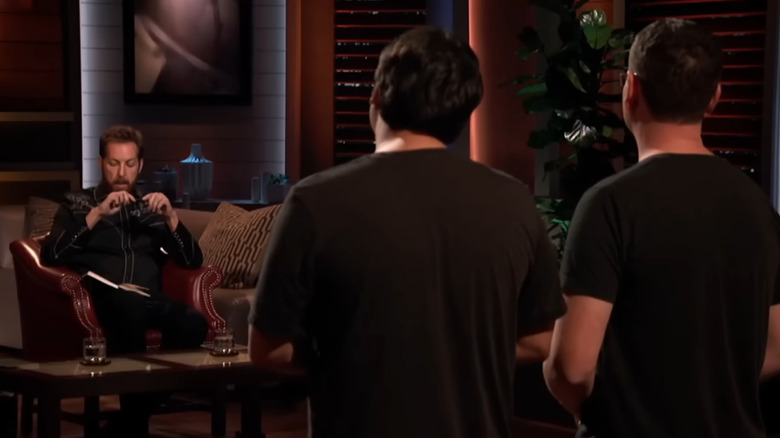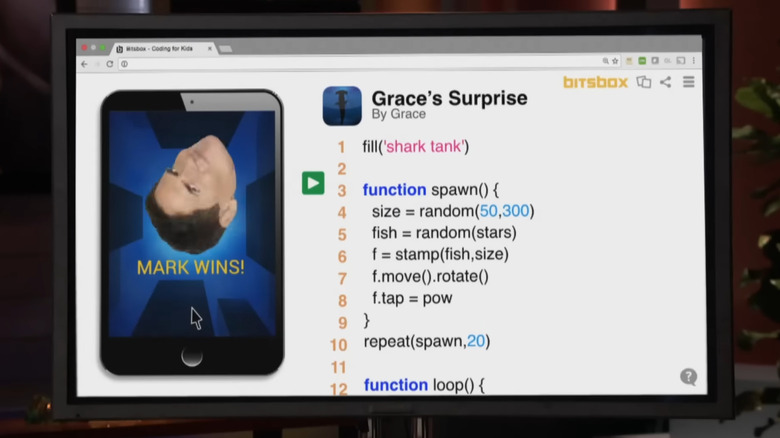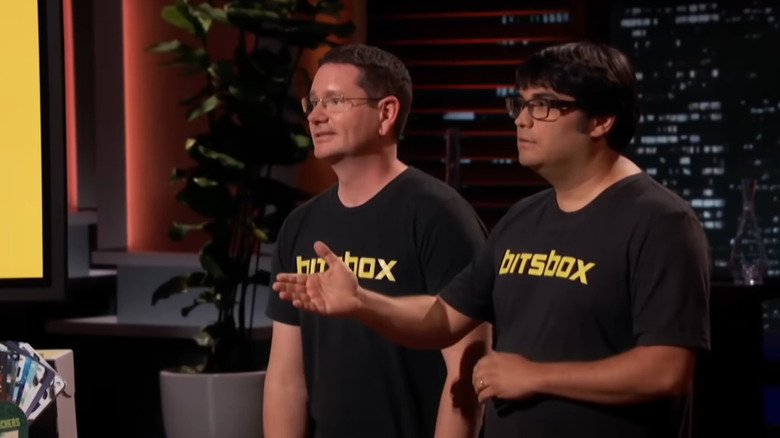What Happened To BitsBox From Shark Tank Season 8?
It's no secret that society is more technology-reliant today than ever before. Generations growing up nowadays not only need to know how to navigate such an advanced world but how to make the most of it to increase their own chances of success. One company that intends to plant that seed is Bitsbox, a subscription-based service that sends monthly kits to families containing a wide array of specialized coding and app-building activities.
The company was started by Google alum Scott Lininger and Aidan Chopra back in the middle of 2014. Lininger had been into coding for much of his life, even selling a plug-in software he developed to Google in 2007. That passion rubbed off on his daughter, who asked if he could teach her about coding. He developed a prototype for what would become Bitsbox and the positive impression it left on her got Lininger thinking about expanding the idea into a startup. He teamed up with Chopra, himself possessing a background in architecture and 3D modeling, to start the business, getting support from an accelerator program before launching a successful Kickstarter campaign that raised over $253,000. From there, they received positive press from major outlets such as Forbes and CBS News.
"Shark Tank" is no stranger to tech products catered to kids, from Season 11's 2-in-1 device, the Tanoshi Kids Computer to another youth-focused coding platform from Season 12 Hopscotch. Even then, the Bitsbox team managed to leave a largely good impression throughout the course of their pitch. However, a near-deal they were about to reach with a shark was uprooted by the team's less-than-stellar decision-making.
What happened to Bitsbox on Shark Tank?
Scott and Aidan appeared before the sharks hoping to get a $250,000 investment for a 3% stake in Bitsbox, equating to an $8 million valuation. Their presentation began with a 10-year-old girl named Grace who demonstrated both how to use the app and her own enthusiasm for the field of coding, which in of itself impressed the sharks.
The subscription price ranged from $20 to $40 a month depending on the package. The team were spending $10 on each kit, but could lower the cost as the operation scaled. Within less than two years, they brought in $1.3 million in revenue and were on track to be cash flow positive that quarter. They wrapped a seed round the previous summer for $500,000 on a $4 million valuation. Their reasoning for the valuation increase came from looking at their revenue to date and doing a 10x multiple on it.
The sharks loved the motivation behind the business, but few felt they were appropriate as investors. Even the usually harsh Kevin O'Leary kindly backed out, admiring the team's efforts to get more Americans in the engineering field. The only shark to make an offer was famed tech investor Chris Sacca. He offered the $250,000 for 5% equity, bringing the overall valuation down to $5 million. The duo, wanting to stay loyal to their previous investors, made numerous counteroffers to try bringing the value up by even a few decimal points. Sacca didn't appreciate feeling undervalued and went out, noting that such minor details shouldn't have been their main focus at this phase.
Bitsbox after Shark Tank
The dynamic duo behind Bitsbox exited "Shark Tank" on an undeniable awkward note, losing the opportunity to cut a deal with a shark due to some relatively minor details. But thankfully, Bitsbox's story didn't come to an end after exiting the room and the team's efforts would soon pay off.
Bitsbox's "Shark Tank" segment aired on February 17, 2017, sharing the same episode with the short-stay searching app Hotels By Day. Co-founder Aidan Chopra shared an update on Bitsbox's blog, where he shared how the company's fortunes turned not long after the broadcast. "Not only did we end up raising the money we needed from non-celebrity investors, but the TV exposure gave us a boost that was bigger than we'd dared to dream," he stated. "In the month after we aired, we more than tripled our business and vaulted into the top tier of companies that are teaching kids to code. Our team has grown from five to eight ... and we've doubled our office space—we're setting up a video studio, of all things. Things have never looked better for Bitsbox."
Throughout the rest of 2017, this sentiment would continue holding true. By November, the team had developed more advanced kits that allowed for a wider range of activities and challenges. Additionally, Bitsbox partnered with numerous organizations and schools across Colorado to promote coding programs, including the Saint Vrain Valley School District, Colorado Children's Hospital, and Impact on Education. The company even took home the inaugural Cube Award for Best Children's Box from the Subscription Trade Association in May 2017.
Is Bitsbox still in business?
Bitsbox continues to endure long after its time on "Shark Tank," with its core mission remaining as strong as ever. Over the last few years, the company has expanded its offerings to go beyond its initial subscription model, particularly when it comes to making the program more accessible for educators. Speaking with Medium in 2020, co-founder Aidan Chopra commented, "There are so many educators who really love our product, but they're just using our consumer version ... That's why we decided we can make Bitsbox with an education-specific flavor, that's easier for teachers to use in school. More importantly, this approach works from an impact point of view. Now we can get out to public schools and we can get out to a much wider range of kids who otherwise cannot afford to buy the Bitsbox for personal use."
For regular home use, Bitsbox currently offers three subscription options. These include a Digital kit, a Basic kit, and a Premium kit. The prices for each subscription vary depending on both the package itself and whether you decide to sign up for a monthly, three-month, six-month, or annual plan. Schools and homeschools have specialized sign-up options where they can order project books separated by units or receive multiple coding levels at once. The service has received largely positive reviews from parents and educators alike, with many noting noticeably high levels of enthusiasm by kids when as they get to design their own apps.
What's next for Bitsbox?
It's clear that Bitsbox has done more than alright for itself. By maintaining its integrity and increasing efforts to make its service more accessible, Bitsbox has gone on to build a strong following and well-earned reputation among families and educators. But even then, the team are well-aware they still have plenty of mountains to conquer.
Stats on Bitsbox's revenue in recent years has been hard to solidify, but in 2020, co-founder Aidan Chopra revealed to Medium that the company had brought in $11 million in lifetime revenue by that point. While certainly no small feat, he admitted that the business was still breaking even at best due to rising advertising and customer acquisition costs. By working to make their boxes more affordable and accessible, they hope to change this fact.
But more than anything, the team not only hopes to increase kid's interest in coding but envisions a world where teaching such skillsets becomes as normal as learning to read or write. "Coding is one of the very few skills that allow you to jump many rungs on the socioeconomic ladder," Chopra shared. "If you can code it doesn't matter what you look like, it doesn't matter what you sound like, it doesn't matter if you speak English very well. It doesn't matter what your parents did for a living. If you're good at coding, you can make a decent living and you can live wherever you want. That's why, if we can get this skill into the hands of children, they could jump in one generation so quickly."




